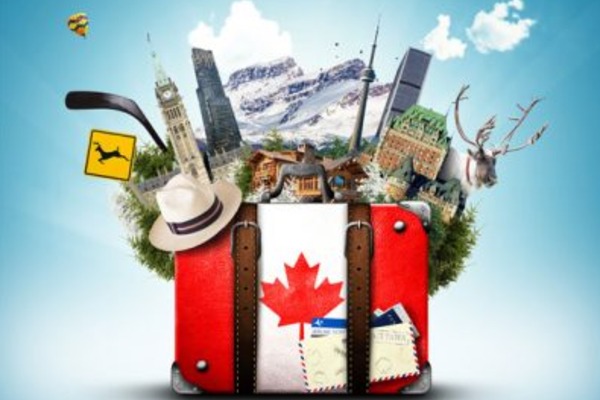UPDATED: They’re Gone

The federal government will remove all COVID-19 entry restrictions, as well as testing, quarantine, and isolation requirements for anyone entering Canada, effective Oct. 1, 2022.
The removal of border measures has been facilitated by a number of factors, including modelling that indicates that Canada has largely passed the peak of the Omicron BA.4 and BA.5 fuelled wave, Canada’s high vaccination rates, lower hospitalization and death rates, as well as the availability and use of vaccine boosters (including new bivalent formulation), rapid tests, and treatments for COVID-19.
Health Minister, Jean-Yves Duclos said that: “Thanks largely to Canadians who have rolled up their sleeves to get vaccinated, we have reached the point where we can safely lift the sanitary measures at the border. However, we expect COVID-19 and other respiratory viruses will continue to circulate over the cold months, so I encourage everyone to stay up-to-date with their COVID-19 vaccination, including booster doses and exercise individual public health measures. I also thank the dedicated public health officers and frontline staff at our land borders and airports who have worked tirelessly to protect the health and safety of people in Canada for the last two years.”
Effective Oct. 1, 2022, all travellers, regardless of citizenship, will no longer have to:
- Submit public health information through the ArriveCAN app or website
- Provide proof of vaccination
- Undergo pre- or on-arrival testing
- Carry out COVID-19-related quarantine or isolation
- Monitor and report if they develop signs or symptoms of COVID-19 upon arriving to Canada
Transport Minister, Omar Alghabra noted that: “Canada’s travel measures successfully mitigated the full impact of COVID-19 for travellers and workers in the transportation sector, and helped keep communities safe. Thanks to Canadians who rolled up their sleeves and got vaccinated, we are able to take this great step towards easing measures and returning to normal.”
As well, Transport Canada is removing existing travel requirements. As of Oct. 1, 2022, travellers will no longer be required to:
- Undergo health checks for travel on air and rail
- Wear masks on planes and trains
Although the masking requirement is being lifted, all travellers are strongly recommended to wear high quality and well-fitted masks during their journeys.
Cruise measures are also being lifted, and travellers will no longer be required to have pre-board tests, be vaccinated, or use ArriveCAN. A set of guidelines will remain to protect passengers and crew, which will align with the approach used in the United States.
Public Safety Minister, Marco Mendicino said that: “Since the start, our Government has taken the necessary steps to keep Canadians safe in the face of a global pandemic. COVID-19 border measures were always meant to be temporary and we are making adjustments based on the current situation because that’s what Canadians expect. I want to thank CBSA officers who are at the front line facilitating travel, supporting our economy, and ensuring the safety and security of our communities.”
Individuals are reminded that they should not travel if they have symptoms of COVID-19. If travellers become sick while travelling, and are still sick when they arrive in Canada, they should inform a flight attendant, cruise staff, or a border services officer upon arrival. They may then be referred to a quarantine officer who will decide whether the traveller needs further medical assessment as COVID-19 remains one of many communicable diseases listed in the Quarantine Act.
TIAC Applauds Elimination Of Border Restrictions
The Tourism Industry Association of Canada (TIAC) applauded the Sept. 26 announcement by the federal government that it is removing all COVID-19 entry restrictions, as well as testing, quarantine, and isolation requirements for anyone entering Canada, effective Oct. 1, 2022.
Cruise measures are also being lifted, and travellers will no longer be required to have pre-board tests, be vaccinated, or use ArriveCan.
Beth Potter, President & CEO of TIAC, said that: “For many months, we have been unequivocal in calling on the federal government to lift all remaining COVID-19 restrictions on travel and ensure Canada’s global competitiveness in tourism,” “We have been tireless in our efforts advocating on behalf of our members and the broader industry as we work to recover from the impact of the pandemic.”
TIAC had been calling on the government to permanently lift the vaccine requirement for travel for both domestic and international travellers, in addition to workers in the sector; to cease the practice of mandatory random testing for COVID-19 and replace this practice with wastewater testing for tracking future variants; and to either eliminate the ArriveCan application completely or else modify it to be used solely as a voluntary pre-entry declaration system.
Said Potter: “We are heartened the Government of Canada has heeded our calls, after two long, difficult and devastating years for our industry. We are now focused on rebuilding tourism back to the $105 billion economic powerhouse it was pre-pandemic.”
TIAC is also pleased that the government is moving to permanently lift the mandatory masking requirement on flights as other countries and trading blocs have done, such as the U.S. and European Union.
Potter said that: “We know airlines have the most highly-efficient air filtration systems and effective mitigation measures found anywhere, and that the levels of abuse and harassment of airline crews in enforcing mask mandates has skyrocketed.”
She added that TIAC is currently gathering data with regard to the number of abuse incidents and that there is no other sector in Canada still mandating mask usage.
The tourism industry has faced significant challenges, despite the reopening of the country earlier this year, including a worsening labour shortage, supply chain disruptions, inflation at a 40-year high, rising interest rates and other increased costs, all of which are hampering the sector in its drive to recover.
Dropping Of Restrictions Welcomed By Air Canada
Air Canada also welcomed the federal government’s decision to lift remaining COVID-19 restrictions, including requirements for wearing masks on aircraft, testing and quarantine, and the compulsory use of ArriveCan beginning Oct. 1, 2022.
Craig Landry, Executive Vice-President and Chief Operating Officer at Air Canada, said: “Air Canada welcomes the removal of these restrictions, acknowledging that air travel is safe and that the measures were not justified by science. We believe it will greatly facilitate travel, help to continue stabilizing the country’s air transport sector and support Canada’s economy. Customers and crew will still have the option to wear masks and we also encourage customers to monitor their own health to be sure they feel well and fit to travel,”
Landry continued: “While today’s announcement is a positive step, we urge the government not to lose momentum. Lessons learned during the pandemic should now be applied to streamlining the air transport system in Canada and to enact further reforms. This includes improving processes, such as security and customs at airports, developing new trusted traveller programs, deploying new technologies and, more fundamentally, re-examining the user-pay model that finances air transportation in Canada, whose weaknesses and interdependencies were exposed by COVID.”
The relaxed measures announced today are expected to advance Air Canada’s ongoing recovery from COVID. Working with our partners and stakeholders in the industry, we are returning to pre-pandemic service levels. This includes significant improvements in on-time performance as compared to earlier in the summer, meaningful reductions in delays and cancellations, a daily flight completion factor now over 98%, as well as baggage handling performance that has fully restabilized at pre-pandemic levels.
WestJet Reacts
WestJet Group’s CEO Alexis von Hoensbroech commented on Canada’s removal of travel restrictions, stating: “Throughout the pandemic, WestJet has advocated for health and safety measures that were grounded in science and data and were consistent with all consumer activities. Today’s announcement aligns with the travel policies of other major nations, reflects our industry’s outstanding commitment to safety, and recognizes that air travel is no less safe than any other consumer activity.”
He continued: “As Canadians and international visitors look to make travel plans, the long-awaited removal of all remaining measures effective October 1, 2022 will further expedite recovery for our industry and the Canadian economy. We are relieved our guests can finally travel with additional confidence and certainty, knowing they can make decisions that are the best for them, and their travel plans won’t be interrupted.”
A Win For Alaska Cruising
There’s no doubt that Holland America Line is pleased by the Sept. 26, 2022 announcement that Canada was lifting all of its border restrictions.
Holland America’s president, Gus Antorcha commented on the announcement that: “This is a win for the cruise industry and for our guests, as we are seeing growing interest for booking 2023 cruises to Alaska and Canada/New England.”
Antorcha continued: “It’s a positive step that puts health protocols for our Canada and Alaska cruises more in line with most of our other global cruises. We thank Transport Canada for taking action that will continue to protect the health of travelers while also making it easier for them to book a cruise that allows us to support the local economy.”
In addition to Canada lifting its border measures, Holland America Line is making it even easier for guests to plan for a cruise with a new Health Protocols Tool on Holland America Line’s website.
Now booked guests can simply enter their booking number and the exact vaccination and testing requirements will be outlined. All 2022 cruises are available, and 2023 departures are to be loaded soon.
Applause From Canada Jetlines
Canada Jetlines is also applauding the federal government’s decision to remove COVID border measures.
Eddy Doyle, CEO of Canada Jetlines, said that: “This is a critical step for inbound and outbound travel and tourism in Canada. We appreciate the difficult decisions that needed to be made to ensure the safety of Canadians over the last two years. We are confident that this very important move will align Canada with many other countries around the world and will contribute to economic growth, job creation and free movement.”
A Reminder
The Government of Canada also reminds travellers to make informed decisions when considering travel outside of Canada to protect their health and safety.
They are encouraged to review the travel health notices at https://travel.gc.ca/travelling/advisories for more information on safe travel.
Some Quick Facts Of Note Include:
- Travellers must follow any provincial or territorial COVID-19 requirements as applicable. Foreign nationals must still meet the entry requirements under the Immigration and Refugee Protection Act and provide appropriate travel and immigration documentation as necessary.
- Air carriers will no longer need to validate that travellers have entered information in ArriveCan before boarding.
- As of Oct. 1, 2022, travellers who entered Canada in the 14 days prior to Oct. 1, 2022, will not be required to complete the remainder of their quarantine or isolatation, or complete their testing requirements.
While travellers will no longer have to submit their quarantine and vaccination information through ArriveCAN, they can continue to use the optional Advance Declaration feature in ArriveCAN (free as a mobile app or on the Canada Border Services Agency (CBSA) website) to save time at the airport by submitting their customs and immigration declaration in advance of arrival.
- This feature is currently available to travellers arriving at Toronto Pearson, Vancouver, or Montréal-Trudeau international airports and will expand to the Calgary, Edmonton, Winnipeg, Billy Bishop Toronto City, Ottawa, Québec City, and Halifax international airports in the coming months.
- Early data shows that using the Advance CBSA Declaration in ArriveCAN cuts the amount of time a traveller spends at a kiosk by roughly one third, and over 30% of travellers arriving at the airports are already using it.
- The CBSA will continue to make technology available at the border to speed up traveller entry and enhance the safety and security of Canadians. For example, CBSA is exploring other optional ArriveCAN features to provide travellers with easy access to information such as border wait times, and other self-serve functions. This will be expanded to travellers by land so they can make use of available technology to expedite and facilitate their travel.
Tags:


